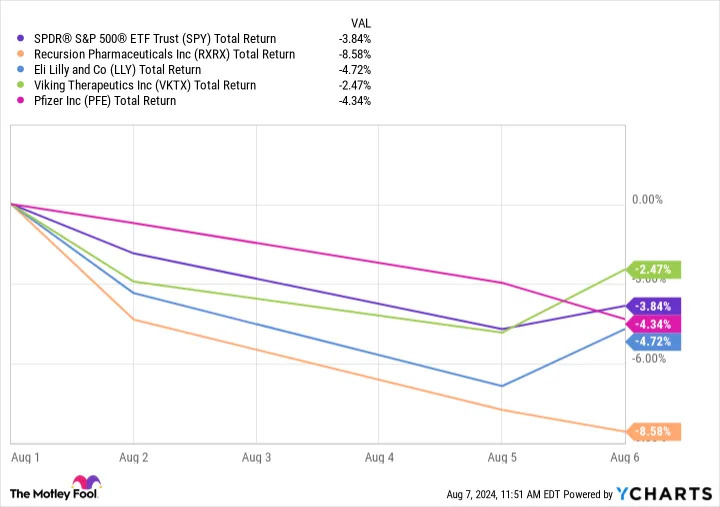Prediction: Buying Biotech and Pharma Stocks During This Sell-Off Will Be a Smart Move
The market is a bit jittery right now thanks to a confluence of factors, including a weaker-than-anticipated U.S. jobs report, international geopolitical issues, and foreign currency disruptions -- all of which led to a sell-off on Aug. 5. It's reasonable for investors to be a bit nervous about committing more of their capital given the volatility and ongoing uncertainty.
Nonetheless, I predict that loading up on a basket of biopharma stocks during this unsteadiness will prove to be a profitable decision in the long run. Here's why.
More insulated from disruption than it may seem
To start, let's examine the mid-sell-off performance of a few popular biotech and pharma stocks. Recursion Pharmaceuticals (NASDAQ: RXRX) , Eli Lilly (NYSE: LLY) , Viking Therapeutics (NASDAQ: VKTX) , and Pfizer (NYSE: PFE) are all depicted in the chart below:

As you can see, the big pharma stocks, Pfizer and Eli Lilly, held their value better than Recursion, which doesn't yet have any recurring revenue from sales. Viking has no approved products yet either, but it likely benefited from the hype surrounding weight-loss drug stocks.
This makes sense when you consider the factors driving the sell-off. The big pharmas were largely not the type of stocks that traders and investors were buying using proceeds from the carry trade. High-growth names in the Magnificent Seven like Nvidia were more what traders were after, so the downside exposure in those stocks is high, at least temporarily.
At the same time, neither of the big pharma companies is very vulnerable to the forces causing the weak jobs report. People purchase medical services because they are often necessary to survive. Healthcare systems buy medications because they're necessary to treat patients. In short, customers are probably not going to buy fewer medicines if th]e economy slows, as the jobs report implies.
If future data confirms it, the second-order effects of a slowing economy will likely be the Federal Reserve opting to cut interest rates, thus somewhat lowering the cost of borrowing money. Pfizer has $69.9 billion in debt, and Eli Lilly has $26.3 billion. Cheaper loans would be a tailwind for both, not a headwind.
Therefore, the bull thesis for both Eli Lilly and Pfizer still stands. Buying them today means getting them at a slight bargain relative to before the sell-off. More selling will just deepen the discount.
Biotechs will still be riskier
Viking Therapeutics and Recursion Pharmaceuticals face a slightly different set of conditions in the wake of the sell-off. But both are still ripe for potentially buying the dip, assuming that you're more risk-tolerant than the average investor.
The jobs report has little to do with either player's prospects, now or in the future. Remember, neither has any sales revenue, nor will they within the next year or two at the very earliest. Even a sharp recession probably wouldn't change their plans much, as they're already loaded up with plenty of cash to spend on research and development (R&D).
Furthermore, for biotechs, the lower cost of taking out debt spurred by a possible interest-rate cut is not a major sweetener. But it could become a modest one, the same way it is for the pharma companies.
Recursion currently has $50.1 million in debt and capital lease obligations, while Viking has a scant $1.1 million. If either business manages to report favorable clinical trial data and subsequently commercialize its first therapy program, it might derive some benefit from cheaper borrowing, as both companies have plenty of flexibility to borrow more.
In terms of vulnerability to the unwinding of the carry trade, once again these two biotechs are fairly protected. They aren't among the Magnificent Seven stocks, nor are they considered major growth stocks.
But biotechs are slightly more vulnerable than big pharmas during a sell-off. Biotechs frequently issue more shares of their stock to fund R&D programs and clinical trials. With lower share prices, they can't generate as much capital with a public offering.
So tread a bit more carefully with buying biotech stocks during this sell-off, especially if they're short on cash and too early-stage to take out loans. If there's more marketwide selling, or a recession, or both, you could encounter trouble.
Before you buy stock in Recursion Pharmaceuticals, consider this:




